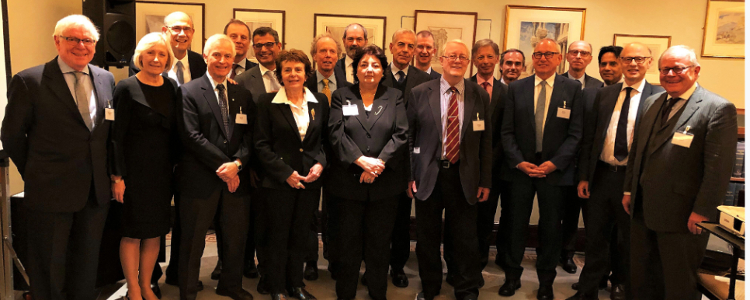
For those who did not know David Marsden, he was one of the most highly cited neuroscientists of the 20th Century. He worked for 17 years as an academic neurologist at King’s College Hospital (KCH) and the Institute of Psychiatry (IoP) in Denmark Hill, and then for 11 years at the National Hospital for Neurology and Neurosurgery at Queen Square. Although he died young, he remains one of the most influential people in the field of movement disorders and neurology.
Most of his work related to Parkinson’s disease (PD), dystonia, tremor, myoclonus and other movement disorders. To mark 20 years since his death, and 80 years since he was born, a half-day movement disorders symposium was organised at the Athenaeum club in Pall Mall.
The symposium was attended by movement disorder specialists from across the world, plus David’s former wife and four of his daughters. It featured ten talks delivered by ex-fellows from King’s or Queen Square, or both, all of whom hold senior Professorships. Mark Hallett, Peter Jenner, Jose Obeso, Tony Lang, John Rothwell, Brian Day, Niall Quinn, Marjan Jahanshahi, Kailash Bhatia and Andrew Lees presented an excellent perspective of their own experience of working with David. It was most interesting to see how they carried forward the ideas of that time, and how things changed over the years that followed their fellowship days, or with their time spent with him at Queen Square.
Ray Chaudhuri, representing David’s legacy at King’s, chaired a session, and Brian Day gave the audience a perspective (in places hilarious) of working with David during his tenure at KCH and IoP. David also worked very closely with Stanley Fahn in New York, and with him set up the International Movement Disorder Society and Movement Disorders Journal. Although Stan could not attend in person, he sent a very warm and personal video appreciation.
All of the speakers are well known for their own work in movement disorders, and their talks were very informative for trainees, fellows, and young consultants like me. While the speakers began the session by remembering the time they spent with David, it was most interesting to see the transformation of the field over the years. David started his career by better defining the symptomatology and pathophysiology of movement disorders, and developed techniques of diagnosis and treatment. Over his life, and following his heritage, David and his fellows have been instrumental in investigating all aspects of movement disorders. Some of the talks were focused on specific areas of David’s work in PD, corticobasal syndrome, dystonia, myoclonus and tremor. Others covered current but related aspects of their research, such as dementia, and Prof Olle Lindvall from Sweden sent an appreciation of David’s pivotal role in developing his pioneering work in foetal nigral cell grafts. The day ended with a clinical video presentation revealing genetic diagnoses of some of David’s patients who were undiagnosed in his life, but later revealed by advances in neurogenetics.
The evening ended with a champagne reception which reminded everyone of David’s love for good wines and his spirit of joy. Everyone raised a glass to toast David’s work and legacy, and his family.
In our rapidly changing world of science, the symposium reminded us of the permanent influence on the field of neurology and movement disorders that David Marsden has left us